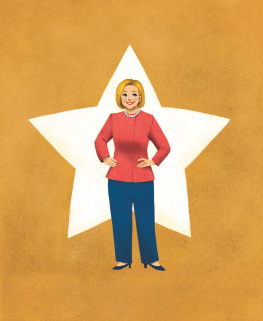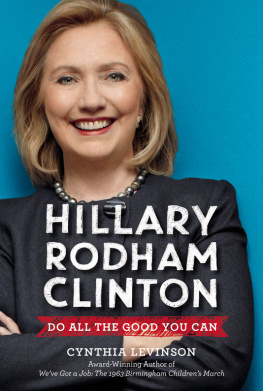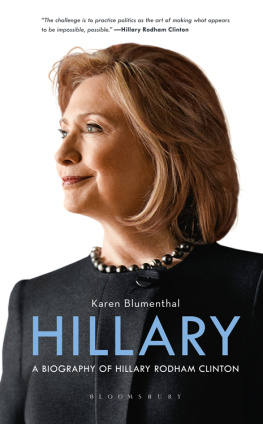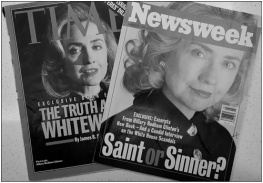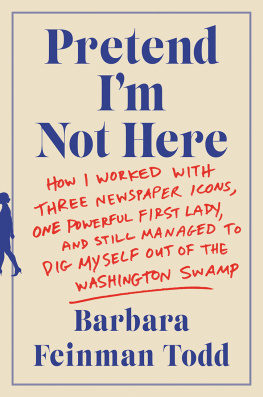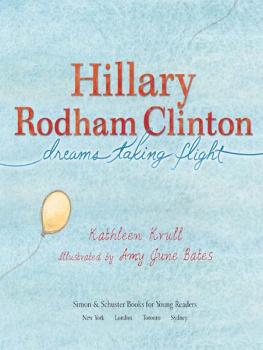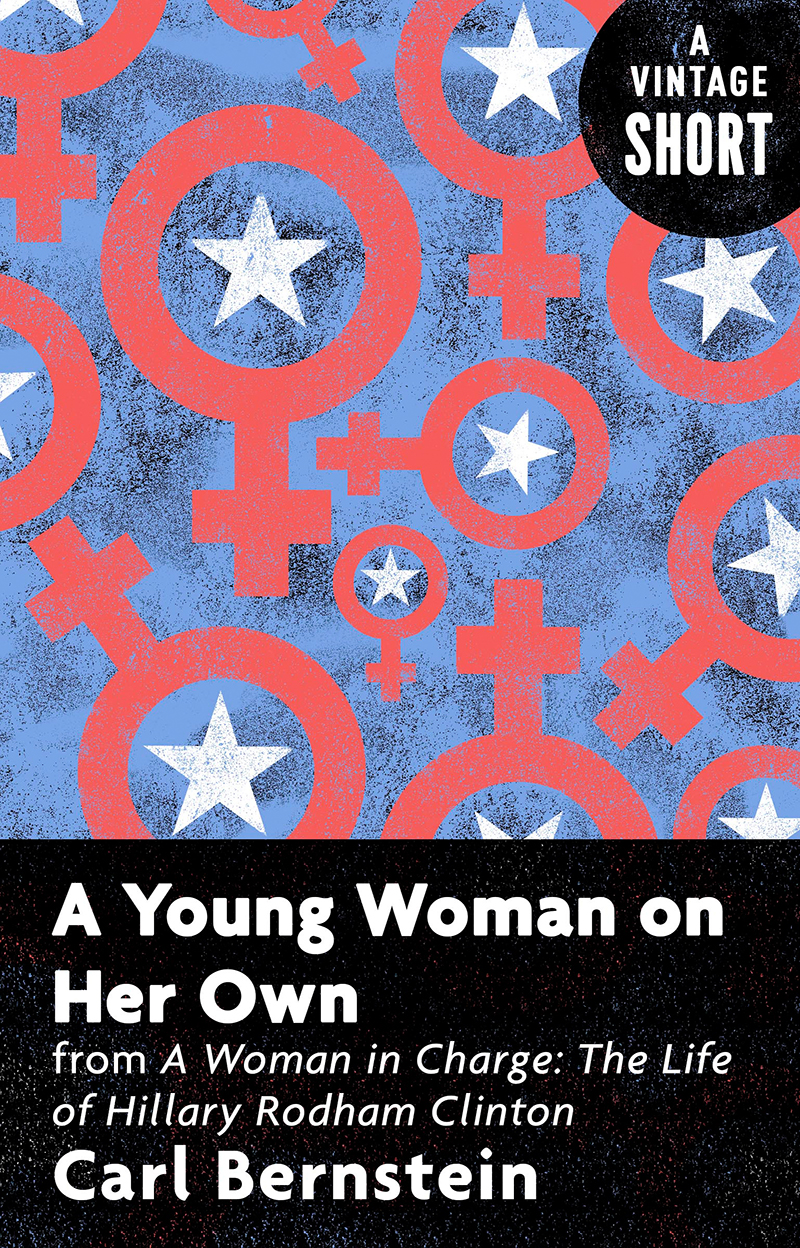Carl Bernstein, with Bob Woodward, shared a Pulitzer Prize for their coverage of Watergate for The Washington Post. He is the author, with Woodward, of All the Presidents Men and The Final Days, and, with Marco Politi, of His Holiness: John Paul II and the History of Our Time. He is also the author of Loyalties, a memoir about his parents during McCarthy-era Washington. He has written for Vanity Fair (where he is also a contributing editor), Time, USA Today, Rolling Stone, and The New Republic. He was a Washington bureau chief and correspondent for ABC News. He lives with his wife, Christine, in New York.
A Young Woman on Her Own
from A Woman in Charge: The Life of Hillary Rodham Clinton
Carl Bernstein
A Vintage Short
Vintage Books
A Division of Penguin Random House LLC
New York
Copyright 2007, 2008 by Carl Bernstein
All rights reserved. Published in the United States by Vintage Books, a division of Penguin Random House LLC, New York, and in Canada by Random House of Canada, a division of Penguin Random House Canada Limited, Toronto. Originally published in slightly different form in hardcover as part of A Woman in Charge in the United States by Alfred A. Knopf, a division of Penguin Random House LLC, New York, in 2007.
Vintage and colophon are registered trademarks of Penguin Random House LLC.
The Cataloging-in-Publication Data for A Woman in Charge is available from the Library of Congress.
Vintage eShort ISBN9780525433798
Series cover design by Perry De La Vega
www.vintagebooks.com
v4.1
a
Contents
Nineteen sixty-eight was a watershed year for the country, and for my own personal and political evolution.
Living History
H ILLARY D IANE R ODHAM arrived at Wellesley College in the fall of 1965 a Barry Goldwater conservative, her well-worn copy of his famous book The Conscience of a Conservative in her suitcase. A relatively sheltered, suburban Midwest teenager, she was suddenly in the company of formidable young women who had gone to private boarding schools, summered in Europe, spoke foreign languages with ease, and possessed sophistication of a sort that had long defined the Wellesley aura. That she had been in the top 5 percent of her class at Maine South meant little. Hillary was no longer considered brighter than most of her classmates. In fact, admission to Wellesley, even more than the other Seven Sisters colleges in the Northeast, was predicated on the assumption that, upon matriculation, you were demonstrably brilliant. Most of her fellow students had been in the top 1 or 2 percent of their high school graduating class. In 1965, Harvard, Yale, Columbia, Brown, and the other traditional Ivy League universities were still all-male bastions. Thus Wellesley had its pick of almost any girl in the country who aspired to the best possible education (and could afford it or win a scholarship).
In this rarefied environment, Hillary felt intimidated and lonely at the start, a foreigner in a strange place she had seen only in pictures. Her decision to go east to a womens college had been inspired by a high school teacher who had attended Wellesley; Hillary gave it preference over the other Seven Sisters schools partly on the basis of photographs of the campus: bucolic acres of rolling green, wooded horse trails, and crystal-clear ponds. Pictures of Wellesleys Lake Waban reminded her of Lake Winola, where she had summered in the Poconos. To this postcard scene, Hillary brought her suitcases packed full with Peter Pan blouses, box-pleat skirts, penny loafers, and knee socks. It became obvious soon after her parents had left her on the campus and had headed back home (her mother crying much of the way) that she had won admission to, and chosen to attend, a school in which more glamorous and accomplished young womendebutantes, many of themwere on the fast track. If she were to compete, it would have to be on her own terms. In this, she would be helped immensely by the countrys changing mood, culture, politics, and philosophies of gender during her undergraduate years. There would be no need, as it turned out, for the girl with Coke-bottle glasses and complicated political notions to hold to the old model of a Seven Sisters perfectly mannered woman.
Robert Reich, who would become President Bill Clintons secretary of labor, met Hillary when she was a Wellesley freshman wearing bell-bottoms, board-straight blond hair, and no makeup. She and I were self-styled student reformers then, said Reich, years before the radicals took over administration buildings and shut down the campuses. We marched for civil rights and demanded the admission of more black students to our schools. Even then we talked of bringing the nation together. We were naive about how much we could accomplish.
In fact, the last thing on Hillarys mind at Wellesley seemed to be adherence to the old paradigms, either political or gender-based.
Hillarys mother had taught her that, above all else, she could do anything, aspire to anything, that there was no reason for a daughter to aim for less than her brothers. Hillary would later describe herself as a transitional figure in regard to the womens movement, caught between two epochspre-feminist and post-feministand the demands and opportunities of each. However, as one less-conflicted Wellesley graduate observed, Hillary might not have considered or understood another possibility: that it is not hard to have it all; but its hard to have it both ways.
Hillarys time at Wellesley was not made easier by whatever tendency toward depression she had either inherited or developeda tendency that surfaced again in the White House. Periodically at Wellesley she fell into debilitating, self-doubting funks. During the early weeks of her freshman semester, she was so deflated that she called home and confessed failure and an inability to cope. She had never been away from homeeven for a weekendon her own before. She missed the comfortable precincts of Park Ridge, and insisted she was incapable of adjusting to the Wellesley milieu. Whatever her anger at her father, she briefly seemed to miss him. He said she could come back to Illinois, but Dorothy said she didnt want her daughter to be a quitter. Her mother prevailed.
After Hillary decided to stay at Wellesley, she seemed to regain some of her old confidence and began making friends who would figure in the rest of her life. But even as she steadied her footing, there were stumbles and persistent signs of melancholy. In the winter of 1967, her junior year, she again experienced what she described in a letter as her recurring February depression. Despite earning As, dating a Harvard man regarded as a good catch, and working off-campus with disadvantaged children (including a seven-year-old Negro girl she tutored and had formed a close bond with), she sometimes overslept, nodded off in her classes, and became concerned that her teachers regarded her as a washout. Why am I so afraid? she wrote to her high school friend John Peavoy. Or why am I not afraid? Am I really not unique after all? Will I have a clichd life? Is life merely absurd? (Hillary now sounded like a character in


